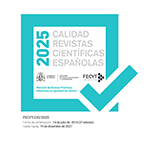Ideology, metaphor and persuasion in times of elections: a corpus-based study of British and Spanish economic reports
Abstract
Metaphor has been studied as a pervasive and intrinsic discourse tool over the last decades in many different types of discourse (Lakoff and Johnson 1980, Semino 2008, Kövecses 2010, etc.). Considering the strong effect it has on the discourse participants and how it can persuade them towards one side, action, or thought (Charteris-Black 2004, Silaski 2012), it is necessary to study it when the timeframe and the discourse where it is used are ideologically loaded. Based on recent studies on metaphor in economics (Alejo 2010, Herrera-Soler and White 2012, Soares da Silva et al. 2017), metaphor in the press (Koller 2004/2008) and metaphor and ideology (Goatly 2007, Silaski 2012), this article presents a corpus-based study of metaphor in reports of economic affairs in the English and Spanish press during the pre-election week of 2015. The corpus (about 160,000 words) consists of reports published by six newspapers that support different political spheres (left, centre and right): The Guardian, The Independent and The Telegraph in English, and Público, El País and ABC in Spanish. From a Critical Metaphor Analysis perspective (Charteris-Black 2004), the study starts from the hypothesis that the political stand of each newspaper might condition the metaphors. Indeed, metaphors pointing at certain side of political spheres appear in all the sub-corpora of the study, but in distinctive ways, as will be shown. In any case, critical factors such as cognitive and cultural reasons beyond the political stand of the media in question need to be acknowledged as well, which conveys further and more comprehensive analyses.
Downloads
Article download
License
In order to support the global exchange of knowledge, the journal Complutense Journal of English Studies is allowing unrestricted access to its content as from its publication in this electronic edition, and as such it is an open-access journal. The originals published in this journal are the property of the Complutense University of Madrid and any reproduction thereof in full or in part must cite the source. All content is distributed under a Creative Commons Attribution 4.0 use and distribution licence (CC BY 4.0). This circumstance must be expressly stated in these terms where necessary. You can view the summary and the complete legal text of the licence.









